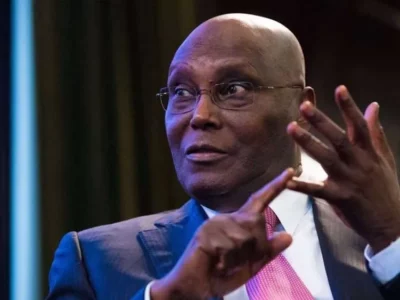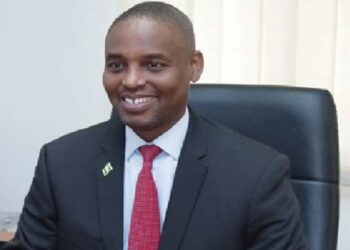Presidential candidate of Peoples Democratic Party, PDP, Atiku Abubakar, said yesterday Nigeria was currently being dressed in borrowed robes, adding the he would improve Nigeria’s economy with a “warm handshake” for the private sector.
Recall that Nigeria’s current debt, local and foreign, stands at N41trillion, with the nation spending a greater chunk of its revenue to service debts.
Abubakar said the All Progressives Congress-led government has distorted the economy since 2015, adding that basic commodities are now beyond the reach of ordinary Nigerians.

The PDP standard bearer, who spoke at the presidential economic agenda forum of the Lagos Chamber of Commerce and Industry, LCCI, said: “Nigeria is being dressed in borrowed robes.
“APC has consistently run on a budget deficit since 2015, above three percent permissible threshold under FRA… and more if you add CBN and AMCON debt in ways and means.”
On his plans for the economy, Abubakar said he will pursue a “warm handshake policy for the private sector”.
He said: “We will ensure we give a warm handshake to the private sector. They are important for any sector or economy to succeed.
“I enjoy making people rich. I feel fulfilled when I make opportunities for others.”
Abubakar said the country’s economy was “bleak and our challenges daunting; no one should downplay the enormity of the tasks ahead.
‘’Indeed, I cannot think of a more daunting challenge than restoring confidence in the future of Nigeria as a dynamic economy and stable democracy.
“I have a good grasp of the challenges bedevilling Nigeria. I know the root causes of our problems. I know that many of these problems are self-inflicted and can be reversed if we are determined. And we are determined.
“I will not come unprepared. It is not in my character as a businessman or as a public officer to be caught off guard. My policy document contains the right policies that will be timely delivered.”
Atiku said Nigeria was “broke” and that the economy was “crawling rather than growing”.
He said: “Per capita income, a measure of citizens’ well-being, has progressively fallen since 2015 because of declining output and a fast-growing population. Nigerians are worse off today than they were in 2015.
“The oil and gas sector, which is the economy’s lifeline, has suffered a decline in 19 of 30 quarters since 2014. For many economic sectors and for the ordinary citizens it still feels as in a recession.
“Under the present administration, our people are not working. More than 23 million people are out of jobs. In just five years, between 2015 and 2020, the number of fully employed people dropped by 54%, from 68 million to 31 million people.
“The number of unemployed people is more than the population of Lagos State or the inhabitants of the Federal Capital Territory (FCT), Abia, Bayelsa, Cross River, Ebonyi, Kwara and Nasarawa states combined.
“What is even more worrisome is that the majority of the unemployed are young men and women, who lack not only the means to survive but also any hope for the future.
“The number of unemployed youths increased by nine million from four million in 2015 to 13 million in 2020.
“Nigeria is broke. Nigeria under the APC-led government has consistently run-on budget deficits since it came to power in 2015. These budget deficits are often above the 3% threshold permissible under the Fiscal Responsibility Law.”
Atiku added that Nigeria was breaching “one of the applicable debt-sustainability thresholds” by spending more on debt servicing than the country’s revenue.









